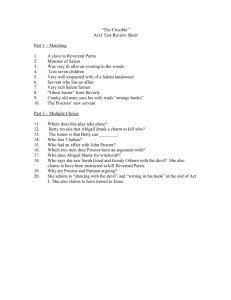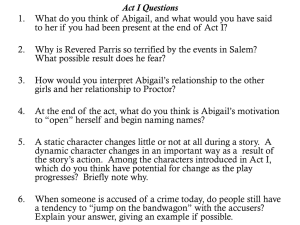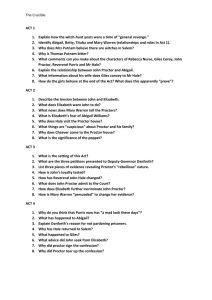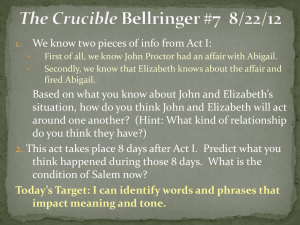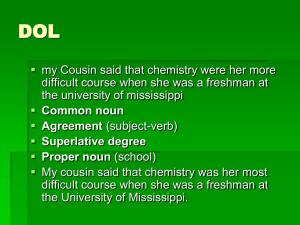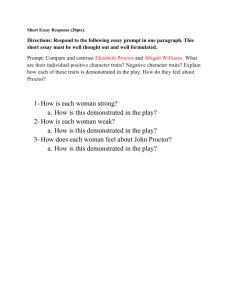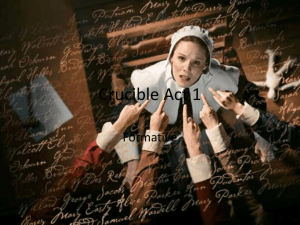Key Quotations for `The Crucible`
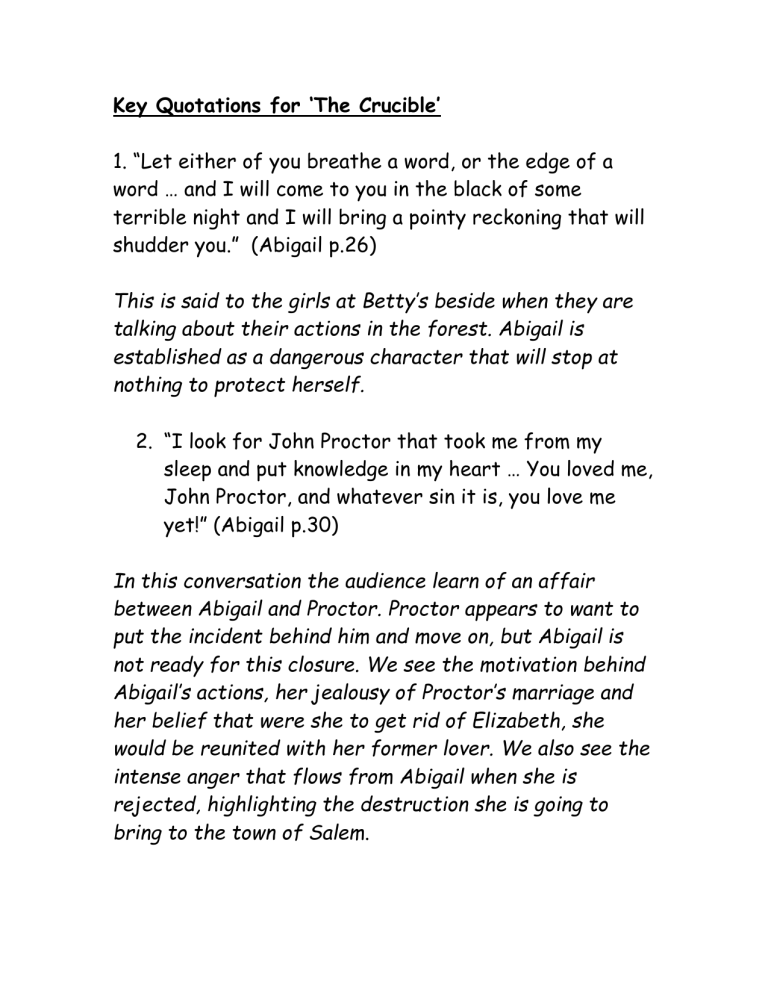
Key Quotations for ‘The Crucible’
1. “Let either of you breathe a word, or the edge of a word … and I will come to you in the black of some terrible night and I will bring a pointy reckoning that will shudder you.” (Abigail p.26)
This is said to the girls at Betty’s beside when they are talking about their actions in the forest. Abigail is established as a dangerous character that will stop at nothing to protect herself.
2.
“I look for John Proctor that took me from my sleep and put knowledge in my heart … You loved me,
John Proctor, and whatever sin it is, you love me yet!” (Abigail p.30)
In this conversation the audience learn of an affair between Abigail and Proctor. Proctor appears to want to put the incident behind him and move on, but Abigail is not ready for this closure. We see the motivation behind
Abigail’s actions, her jealousy of Proctor’s marriage and her belief that were she to get rid of Elizabeth, she would be reunited with her former lover. We also see the intense anger that flows from Abigail when she is rejected, highlighting the destruction she is going to
bring to the town of Salem.
3. "If it were not Abigail that you must go to hurt, would you falter now? I think not.“
(Elizabeth p.55)
This is from a conversation between Proctor and his wife at the start of Act Two. We are already aware of the affair and are now seeing the impact on the Proctor’s marriage, Elizabeth is deeply hurt and her husband’s refusal to publicly denounce Abigail and her actions only deepens this hurt.
3.
"Oh, Elizabeth, your justice would freeze beer!"
Again from the same conversation, John is frustrated by his wife’s lack of forgiveness and, again, the image of
Elizabeth being the ‘cold’ woman that Abigail refers to in the previous act, is reinforced by this statement. This perhaps gives the audience an understanding of why
Proctor turned to Abigail in the first instance.
5. "Remember, until an hour before the Devil fell, God thought him beautiful in Heaven." (Hale, p. 68)
Hale makes this statement to John who is trying to convince him about the true events of Salem, that it is down to the girl’s manipulation rather than the presence of witchcraft. Hale is convinced, however, of the presence of witchcraft and explains that the Devil had
God fooled, just as people in the town that they thought
good had also been hiding their true nature. The rationality has gone at this point, Hale is blinded to the possibility that he could have been wrong (though we know he later accepts the error of his ways) and goes back to something he knows that he must trust; God. It is the fear of not living under God’s law that is a main motivation for fear in the town and the reason why the mass hysteria spread so quickly and with such serious consequences.
6. “My wife will never die for me! I will bring your guts into your mouth but that goodness will not die for me.”
(John p.74)
John recognises that it is his behaviour that motivated
Abigail’s actions against the town and ultimately his wife and admits to his crime of lechery claiming that he cannot see his wife die for his mistakes. Our perception of their relationship changes as we see Proctor trying to protect his family, despite the consequences for himself.
However, Elizabeth also wants to protect her husband and will not admit to the court of the affair, something that would have bought her freedom, and this provides
Mary Warren with the opportunity to accuse Proctor, himself, of witchcraft.
7. "I have made a bell of my honour! I have rung the doom of my good name."
(Proctor p. 98)
This is one of several times when John refers to the importance of his name and by this he is referring to his reputation and personal integrity, something which we know that affair has affected. It is early in the play his desire to protect his name that prevented him from denouncing Abigail, however, when he realises his wife is in danger, he knows that he must do whatever he can to try and save her; even if it means the ultimate personal sacrifice is Salem.
8. “I denounce these proceedings.” (Hale p.105)
Hale is really the only character that recognises the serious error that he has made in believing the girl’s accusations of witchcraft. He tries to convince the judges also but they are unwilling to acknowledge that they may be wrong. In an attempt to save Proctor and the others, Hale tries to convince them to confess to witchcraft, despite this going again the most basic of
Christian principles; that one must always tell the truth.
It is clear that Hale feels guilty for his part in the executions of innocent men and women and he feels that to save these characters, he will get the inner peace he so desires.
9. “When I speak God’s law, I will not crack its voice with whimpering.”
( Danforth p. 113)
Danforth believes that he must act according to God’s law and it is his duty to flush out any witchcraft in Salem.
He seems more willing than Hawthorne to listen to new evidence, however, he is strong in his belief that the court is acting in the best interests of the community, even when others can see that it has gone too far.
10. “I have given you my soul; leave me my name!”
(Proctor P. 124)
Proctor utters these lines at the end of the play, in Act
IV, when he is wrestling with his conscience over whether to confess to witchcraft and thereby save himself from the gallows. The judges and Hale have almost convinced him to do so, but the last stumbling block is his signature on the confession, which he cannot bring himself to give.
In part, this unwillingness reflects his desire not to dishonor his fellow prisoners: he would not be able to live with himself knowing that other innocents died while he quaked at death’s door and fled. More important, it illustrates his obsession with his good name. Reputation is tremendously important in Salem, where public and private morality are one and the same. Early in the play,
Proctor’s desire to preserve his good name keeps him from testifying against Abigail. Now, however, he has come to a true understanding of what a good reputation means and what course of action it necessitates—namely,
that he tell the truth, not lie to save himself. “I have given you my soul; leave me my name!” he rages; this defense of his name enables him to muster the courage to die, heroically, with his goodness intact.
11. “He have his goodness now. God forbid I take it from him!”
(Elizabeth p. 126)
Elizabeth utters these words after her husband consents to his own death by withdrawing his confession. She recognises the importance for Proctor to regain his personal integrity and knows that she is unable to ask him to sacrifice that to save himself. Throughout the play we have seen Proctor wrestle with his own conscience after the affair and the gulf this has created in his marriage, however, we know feel that this has been filled and the couple have regained the love they once had for one another.

